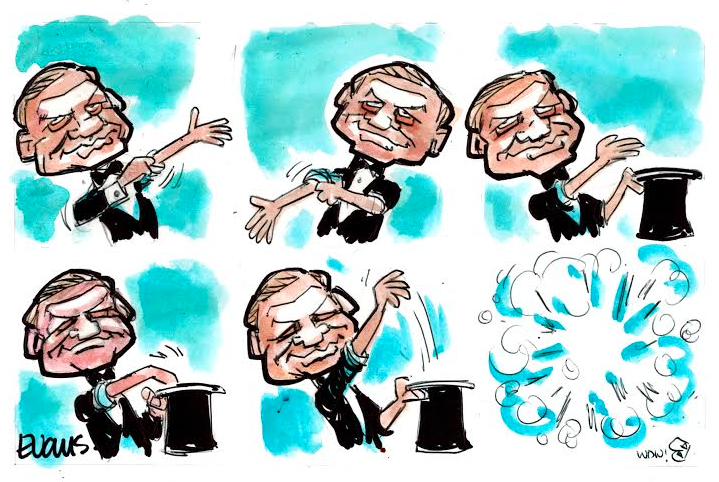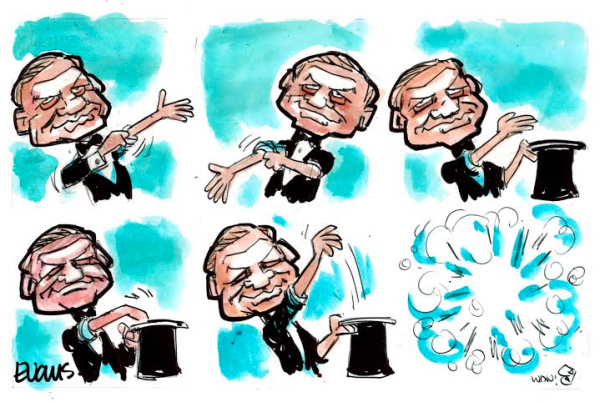It was meant to be a business as usual budget, but the pundits were left baffled. National governments are not meant to lift state support, or so the narrative goes. But lurking beneath the surprising decision to lift Working For Families payments is an indictment: the government is admitting that wages are not growing fast enough. Working For Families payments represent a subsidy for employers who don’t pay decent wages. Last year Bill English talked up a 3.4 percent wage increase for workers over three years, but that figure seems optimistic now. State support is needed to make up the shortfall.
Not only does the budget admit that state support is needed to stop working families from falling into poverty, the decision to lift benefit levels for families on welfare represents an admission that poverty has increased under the government’s watch. Yet they’ve only done the bare minimum. Benefit levels have been lifted, but they have not been returned to pre-1991 levels. The poverty the last National government created with its brutal cuts will remain. After all, $25 spread across a family of five will not do enough to cover rapid rent rises (not to mention house prices which are rising $1000 a day).
And then there are the changes to KiwiSaver. The abolition of the Kickstarter grant makes the scheme more regressive – an incentive for low paid workers to join up is now removed. If you put the $1000 Kickstarter grant into a compound interest calculator and assume a conservative 5% return over a person’s working life then the $1000 actually equals $9906 for someone who starts work today and retires in 2061. The government is actually taking from the low paid… to redirect to the low paid through Working For Families and modest benefit increases.
Taken together, Budget 2015 is an admission that the economy is not working. wages for working families are too low, benefit payments for families on state support are too low as well. But, as a political narrative, it’s a clever budget, some in the mainstream media were certainly fooled. The government is seen to be doing things about poverty – optics are all important for this government – yet in reality it’s only shifting state support to different areas. This has been the story of the National government: strong and counterintuitive optics – it professes concern for poverty – but the reality remains unchanged: poverty and inequality persists.







Very true Robert, thank you for you contribution.
As you describe it ‘optics’ (or as I describe it ‘smoke and mirrors’) is the hallmark of National budgets and this one in particular. By sleight of hand poor kids’ parents get $25 to help but it is only slid sideways from other beneficiaries. Daddy Warbucks’ millions remain untouched.
I’m sure Bill English would like to be seen as being concerned about child poverty but in this budget he looks more like Scrooge McDuck.
And most importantly the $25.00 doesn’t apply till next April. By which time there will have been, perhaps, a rise in GST and/or prescription charges? Who knows?
A phrase that struck me was ‘benefit dependent families.’
I wonder if this language disguises poverty even further, since a decent proportion of children living in poverty have one parent in full time work. (I forget where I read this, but I’m sure it was on TDB).
I Wish people could just see that these clowns just don’t give a damn. It’s all about money and power…same old, same old.
Very poor people and very rich people rarely think about money per se.
Very rich people think only about what they want to do. The financial means of achieving it is, of course irrelevant.
Very poor people are the same. It’s just that the things they want to do are rather more restricted. Like keeping a roof over your head, feeding and clothing the kids and staying warm.
The people who think interminably about money are that obsessional section of the middle class: the financially aspirational. They never think about anything else.
They also, somewhat presumptively assume that we all think like they do. These are the ones who go on about what the ratepayers and taxpayers demand. They imagine that if poor people were given enough to live with dignity on a benefit that they will immediately up stumps and retire to a tax/ratepayer funded deckchair on a surf beach.
In their Pavlovian world the knell of a dimly-heard tax cut has them salivating, while the ungrateful impoverished are considered unworthy of their largesse when they don’t bound up, puppy-like, to lick the master’s hand as he casually tosses a bone from the table.
Actually, what would really make a difference would be if people force to live at the sharp end of society were treated with a little respect. It would be better if their potential contribution to New Zealand life was recognised and encouraged.
If our betters thought a bit less about money and a bit more about what is wrong in our world and how to try to help us all put it right.
I must admit that when I heard Bill English say the there might be the opportunity for more tax cuts closer to the next election my heart sank.
Didn’t yours? If you felt (even guiltily) excited by the prospect, you may be reading the wrong blog.
The last Labour government had 9 years to address benefit levels yet chose to let them stagnate.
http://www.stuff.co.nz/national/politics/415592/Beneficiaries-worse-off-under-Labour-report-reveals
Neither party offer beneficiaries or the wider working class anything other than business as usual.
Comments are closed.